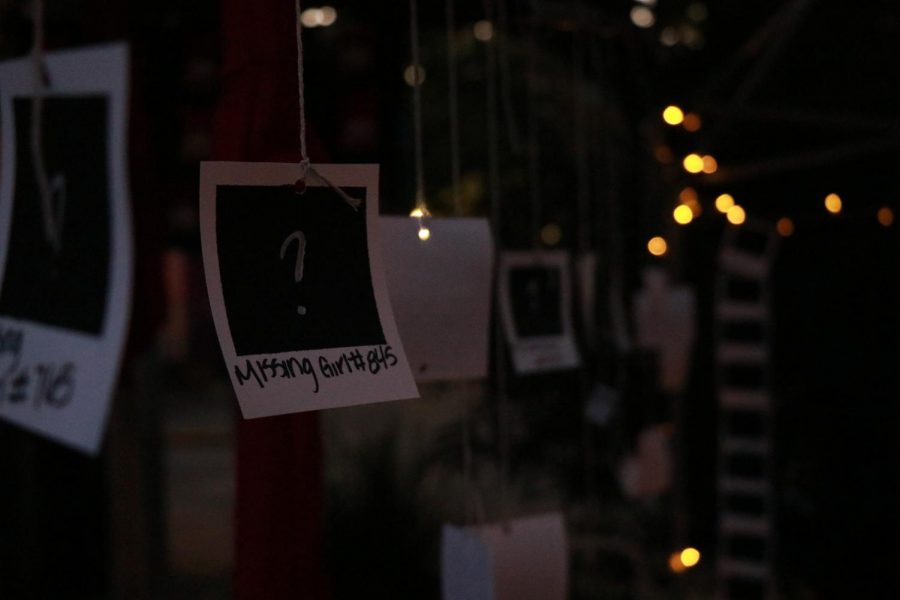Take Back the Night gives voice to survivors
The demonstration against sexual and domestic violence included a resource fair, a rally and a march
In an art installation created by Sacramento State alumna Alexandria Wilson, Polaroids are hung to represent the 1,500 undocumented girls detained and deported by ICE, only to disappear on the other side of the border, Wilson said.
October 14, 2018
Take Back the Night is aimed to connect people to resources, create space for survivors’ voices and raise awareness about gendered violence, according to event chairperson Violeta Gonzalez.
The 39th annual event kicked off Saturday evening at the Sacramento Native American Health Center with a resource fair and booths representing diverse causes and services like LGBT health, racial justice and political organizing as well as sign-making and on-site counseling.
According to the organization’s website, Take Back the Night events are demonstrations against sexual violence replicated across the globe that often include rallies, survivor testimonies and marches.
The Sacramento LGBT Community Center and Black Lives Matter organizations tabled at the resource fair as well as participated in the march. The event committee invited the Brown Berets de SacrAztlan to provide security, said Wendy Callejas, an on-duty Brown Beret member.
Sacramento State student Deion Servelo attended Take Back the Night to represent the Party for Socialism and Liberation, a branch of the ANSWER Coalition.
“The women’s struggle is an important part of the movement in that we live in a patriarchal, capitalist society,” Servelo said.
Servelo said coalition building was critical to the success of social justice movements and that, “Without other organizations coming together, you can’t really build a united front to get your demands met.”
Sacramento State alumna Alexandria Wilson created an altar-like exhibit to raise awareness about 1,500 undocumented girls detained and deported by ICE, only to disappear on the other side of the border, she said.
“There is a huge femicide that is happening in Mexico, where women are just getting stolen off the street, and violence against them is horrendous,” Wilson said. “For our government to be completely responsible for 1,500 girls and not know exactly what happened to them after, with femicide, it’s like, are you serious?”
Three C.K. McClatchy High School seniors attended the demonstration. The school’s Feminist Coalition President Riley Burke said, “I think it’s cool that it’s a celebration and a resistance.”
Local artist Nikki Solone provided an interactive art piece of a fist clutching a rainbow that attendees could paint.
Shakti Rising provided counseling during the event. Naomi Harris, a leadership trainer for Shakti, said the women’s social change organization provides transformational recovery for women, classes through Shakti Feminine University, and volunteer service.
The rally and stage performances began at 6 p.m. with an opening blessing by Marge Grow-Eppard, a Miwok activist.
Toward the middle of the program, local transgender community activist Ebony Harper addressed the crowd.
“There’s a premise to taking back the night,” Harper said. “A lot of our nights were stolen from us, our innocence defiled…but this night right here, it’s a different type of night. Tonight, we reclaim our time. We reclaim the night. We reclaim what was taken from us.”
Other speakers included Tanya Faison of Black Lives Matter Sacramento and Elaine Whitefeather of Foundation of Peaceful Communities.
Tears were shed as survivors shared testimonies of their experiences of sexual assault and finding community after the assaults.
The march around Midtown began around 9 p.m. As the crowd surged through the streets, the chants like “Rape Culture has Got to Go,” “Yes means Yes/No means No,” and “Black Lives Matter,” rippled through the procession.
Stevante Clark attended the rally and participated in the march. He said he was there to stand with “special victims,” who have been “used and abused.”
“I want to stand in solidarity and let them know they’re not alone,” Clark said. “There are such things as victims and I believe there are such things as special victims. I believe me and these women fall in that category as special victims.”





























































































































